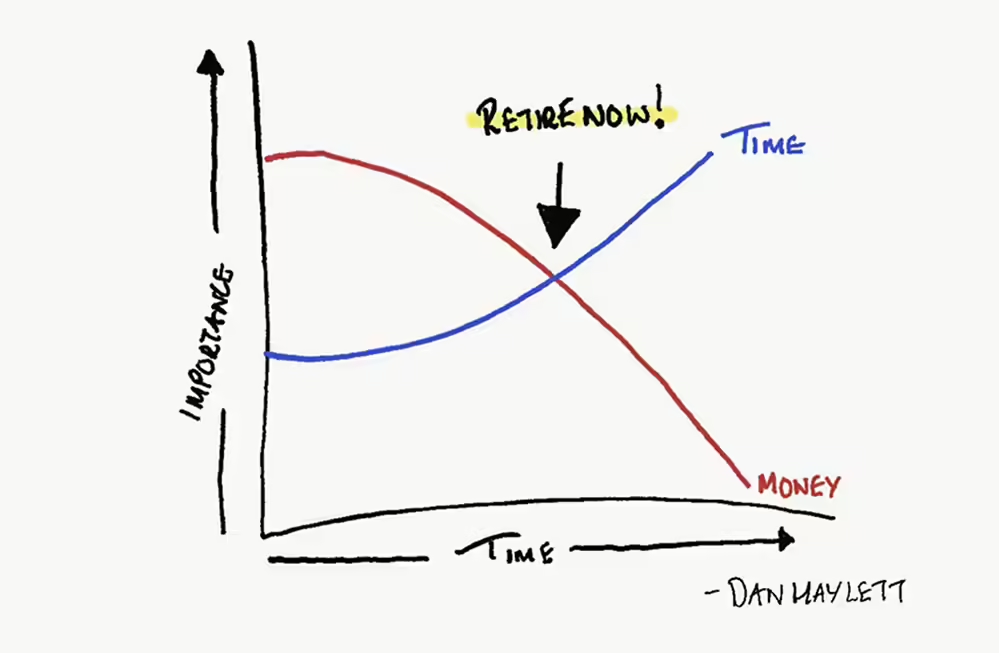
“When your time becomes more important than money.” This is my response when clients ask me to help them decide when the right time is to retire. Typically, there is a pause and a look like “Huh? What do you mean?”
This can be difficult to answer immediately, and I cannot answer it for them. It takes introspection and often conversations with others. Experiencing FOMO as it relates to one’s nest egg vs. FOMO as it relates to doing what matters most before time runs out is understandable.
Changing your retirement mindset
Dan Haylett, a retirement planning expert and regulated financial adviser based in the UK, shares his insights on what it takes to successfully navigate the complex world of modern retirement, financially and non-financially.
In his recent newsletter, “Humans vs. Retirement,” he delves into why time matters more than money in retirement.
He emphasizes that retirement forces us to confront a profound reality: time is finite. “Unlike money, which can be earned, saved, and replaced, time is a resource we cannot replenish. The currency of our lives shifts dramatically. Time, not money, becomes our most valuable asset. While financial security is undeniably important, the freedom to use our time meaningfully defines the quality of our lives during retirement.”
Many enter retirement with the carried-over mindset of prioritizing financial gain and advancing their careers. This mindset can interfere with many valuable opportunities during retirement.
Haylett advises shifting our mindset from “doing” to “being.” Following this new mindset, our focus is no longer on productivity in the traditional sense. Instead, we are given the gift of time to live intentionally and become personally fulfilled in this new phase of life.
During our careers, we have been intentional about making and saving money. It’s been a priority and required discipline, which may have made us feel somewhat uncomfortable. Still, we can use it during retirement to experience a lifestyle we have looked forward to and deserve.
The benefits of shifting your retirement mindset
Haylett offers four reasons why focusing on the importance of time is the number one resource and crucial in retirement. Having time can:
1. Bring fulfillment
Money can buy comfort, convenience, and specific experiences, but it cannot guarantee fulfillment. True fulfillment and satisfaction come from nurturing relationships, pursuing interests you are curious about, or doing something simple, like hanging out and reading a good book.
2. Strengthen relationships
Retirement is an opportunity to invest in building and strengthening bonds with others. This could involve developing stronger relationships with your partner, grandchildren, or friends you have lost touch with or want to spend more time with. Studies show that maintaining meaningful relationships is one of the most important factors in increasing longevity.
3. Promote health and well-being
The freedom to prioritize physical, emotional, and mental health is a powerful gift during retirement. Exercising, remaining relevant, continuing to learn, satisfying curiosities, and meditating are ways to enhance your health and quality of life and increase longevity.
Do what will bring you fulfillment and joy. This could involve traveling to destinations you have looked forward to, experiencing what’s on your bucket list, hanging out reading a good book, or going to a movie during the day.
4. Enable personal growth
Retirement is not an end. It is a new beginning, allowing you to explore passions, learn new skills, satisfy your curiosities, and revisit or rediscover forgotten dreams that will bring purpose, joy, and meaning to you and perhaps others you engage with.

Our relationship with time as we age
Haylett also draws attention to the complicated relationship between humans and time. We have an inherently complex relationship with time. Despite its importance, we often undervalue and misuse it. During our working years, we frequently sacrifice time by putting aside our health, passions, and desires to pursue financial stability or professional success.
The next stage of life is not just about how much money you have saved but how wisely you use this most precious gift of time.
So, if you are conflicted about whether it’s the “right” time to retire, ask yourself what’s more important—time or money.
In retirement, spend time (and, of course, money!) wisely, cherish every moment, and live without regret. Cheers to you!
“I’d rather regret the things I’ve done than regret the things I haven’t done.” –Lucille Ball






